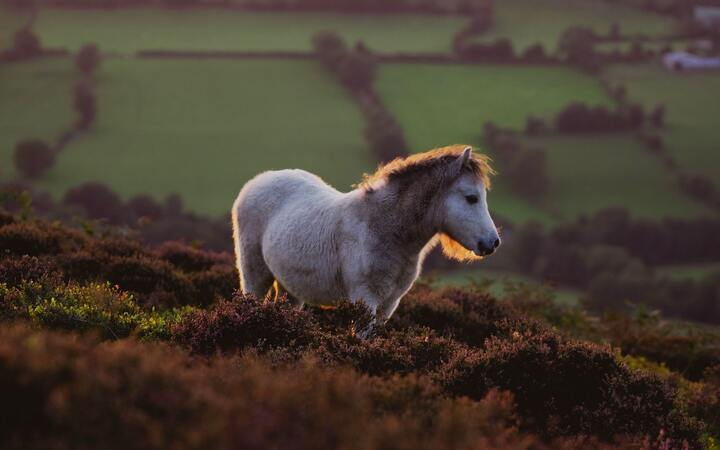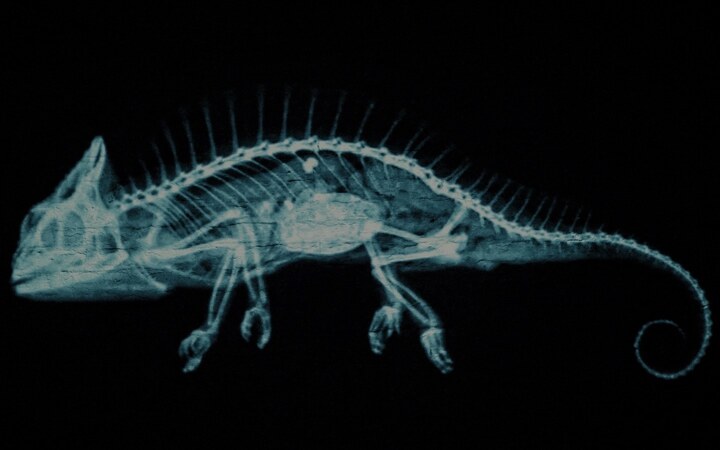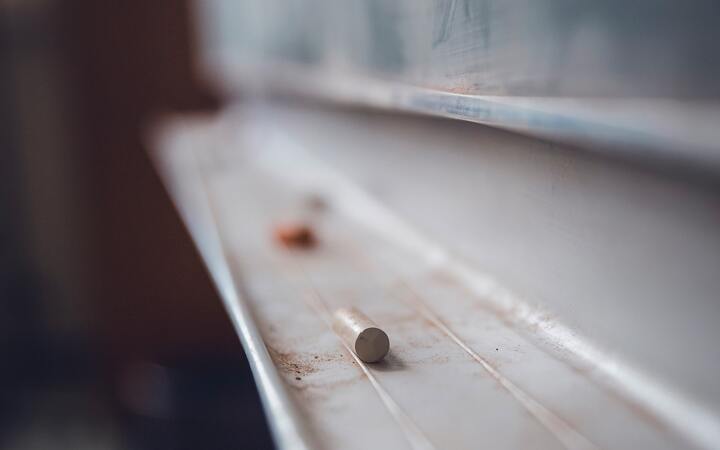-
That Earth is hot—maybe half from radioactive decay and half from leftover heat from when the planet formed—and heat is atoms jiggling around and the faster they jiggle the more often electrons absorb some kinetic energy and spit it out as a photon and when this happens on the surface those photons often escape out into space, meaning that while the center of Earth is as hot as the surface of the sun, there’s a thin temperate skin on the outside for life to cling to.
-
That just inside that skin there’s a 3900 km layer of silicate rock, the top of which is 225°C-ish and acts as a sort of ultra-viscous fluid for chunks of the skin to slowly float around on, which is good because without those chunks grinding into each other, Earth would be a smooth 6357 km × 6378 km ellipsoid which would be boring.
-
That Earth is covered with 1.4 billion km³ of water which is good because it’s a lot and life etc. but also because it’s not too much since the skin chunks only create surface irregularities of ±9.7 km which is more than the 2.7 km of water that would cover the Earth if perfectly flat, so with slightly more water or slightly less twitchy skin there would be water everywhere which would be bad for the 86% of biomass that lives on land including presumably most readers.
-
That the altitude of geostationary orbit increases as the ⅓ power of planetary mass and the ⅔ power of the length of a day which on Earth works out to be neither below the surface where all the magma would get in the way nor in the air where friction would decay orbits but also close enough that it’s not that hard to launch stuff into and it only takes 0.12 s to send signals from the closest part of the planet.
-
That when they put that rat into that breathable liquid in The Abyss, that liquid is real, dude—real—it’s oxygenated perfluorocarbon and while our lungs aren’t strong enough to breathe it for long and doing so appears to be very traumatic, we can cram way more oxygen into liquid than gas, so it’s useful for keeping premature newborns alive.
-
That in the 1940s people got sick of beavers chomping down all the trees but didn’t want to kill them because beavers are awesome but also “horses and mules become spooky and quarrelsome when loaded with a struggling, odorous pair of live beavers” so they sensibly decided to parachute the beavers into the remote Idaho wilderness and to develop the necessary self-opening beaver capsules they used a beaver named Geronimo who would try to run away after each experiment only to be recaptured until “he finally became resigned, and as soon as we approached him, would crawl back into his box ready to go aloft again” but eventually he was dropped off for real with three females and hopefully spent the rest of his days building some really sweet dams.
-
That birds need lots of oxygen, so they have a clever arrangement of air sacs that act sort of like bellows and push air through the lungs unidirectionally instead of just inflating and deflating, so as humans struggle over Himalayan mountains with their silly breathing apparatuses they may notice geese flapping by, honking en passant.
-
That when flying at high altitude in freezing temperatures or deprived of food, many birds can enter a type of regulated hypothermia with reduced body temperatures, which is good because birds are good.
-
That if you breathe through your nose right now (go ahead) you’ll probably notice that most of the air goes through one nostril which maybe seems concerning but is totally normal and caused by erectile tissue that engorges on opposite sides of the nose every few hours, which is good because no one seems sure why evolution did this, making it a nice demonstration of the strangeness of the reality we’ve all been flung into, sitting a few cm in front of your brain.
-
That we have only have five types of chemoreceptors on our tongues but 400 in our noses meaning if you eat some raw potato while smelling an apple it may taste like apple, so am I crazy or shouldn’t we be able to simulate any flavor by combining a few base ingredients and presenting the appropriate chemicals to the nose?
-
That, speaking of noses, dogs have around 50× more chemoreceptors than humans and also many more types of chemoreceptors—exactly how many is debated—and also breathe with one-way air flow over the receptors and also have brains better adapted to process the signals, meaning they experience gorgeous mountain vistas of smells that we can’t imagine, another indication that our lived “reality” is a very contingent thing.
-
That if you stare at your own teeth long enough, they eventually resolve as a frightful array of mineral claws clustered around a food hole, bathed in recirculating bio-liquid and hidden behind quasi-prehensile skin flaps, which is good because it gives a glimpse of how we might look to aliens and also because you’re under no obligation to do that.
-
That the bald eagle population was once reduced to only a few hundred nesting pairs but then we banned DDT and stopped shooting them and they’ve now rebounded to over a hundred thousand and similarly for other once-threatened species e.g. monitor geckos, gray whales, American crocodiles, Steller sea lions, gray wolves, Louisiana black bears, southern black rhinos, and giant pandas, showing again that we can often solve problems when we want to.
-
That tea is good and also that at some point some crazy geniuses in Taiwan noticed that if certain tiny insects bite the plant at the right time it triggers a defense mechanism where it makes different chemicals that taste even better and also that those geniuses developed this process to work at scale at (relatively) modest cost and also that hopefully neither the plants nor the insects have enough sentience that we need to worry about any of this.
-
That humans, god love us, are more driven to react to things by negative emotions than positive ones which, OK, isn’t obviously a good thing, but understanding that reality is helpful when grappling with why everyone seems so mean on the internet.
-
That it’s maybe human nature to obsess over status and approval when young but tire of this when older which if true makes sense since it’s hard to get good at most things and so it’s helpful to have motivation-preserving “side quests” early on but eventually it’s better if people focus on impact rather than the game.
-
That while most of us spend lots of time worrying about what others think of us and trying to mold ourselves to make others like us more, it seems like authenticity and even vulnerability are among the most appealing traits provided you can do them without coming off as needy, which, to be fair, is tricky.
-
That we have amazing drugs that demolish pain during surgery or dental work or childbirth and we also have over-the-counter drugs which aren’t exactly miracles but do help with minimal side-effects, none of which we should take for granted given how deeply pain was wired into us by evolution, and also that it’s usually safe to combine paracetamol/acetaminophen with anti-inflammatories, which works even better though I am (probably) not your doctor and you should consult your doctor before ever stepping outside the house etc.
-
That music, that certain patterns of sound spur deep emotional responses in us, why.
-
That bleach.
-
That yeast.
-
That trash cans that open when you step on them, especially the kind where the lid doesn’t swing open behind the can, so you’re not idiotically smashing the lid into the wall every time you try to use it.
-
That we have many wonderful types of glue that each work well for different types of materials, and if you wield this arsenal correctly you can glue the ever-living hell out of things and fix lots of stuff (shoes! furniture! cutting boards! concrete! kayaks!) that people usually just throw away.
-
That the distasteful layer of dust and oil and grime that slowly settles on all things, if you keep the air clean, does so somewhat less quickly.
-
That you can form melamine resin into a porous low-density foam of interconnected rigid bubbles with nanometer-wide holes and use it as an ultrafine sandpaper to “clean” things, and also it’s great for thermal insulation and soundproofing for studios and pipes and high-speed trains, though I do worry about what happens to all the microplastics.
-
That brakes put particles into the air which is bad and we ignored this for a long time and then for totally unrelated reasons we created new brakes that capture kinetic energy as useful electric energy instead of garbage heat and coincidentally these make almost no particles, which illustrates that because waste costs money, many externalities are at least partially internalized, automatically.
-
That we didn’t get room-temperature ambient-pressure superconductors this year, but there’s no law that says they can’t exist and year-by-year we get new superconductors and slow grinding progress towards this goal and given the obscenely large space of possible structures to explore, it seems likely there’s gold in them hills somewhere.
-
That while the Quran doesn’t explicitly ban visual depictions of Muhammed and nowadays Shia Muslims mostly say it’s OK, it was long seen as idolatrous, so while Western art kind of spent a millennium making pictures of Jesus, Islamic art developed dazzling patterns with a psychedelic mathematical beauty that maybe wouldn’t have been as good in a counterfactual without this prohibition?
-
That while you might object that many of these reasons are different versions of anthropic bias, well isn’t it fortunate that anthropic bias exists, meaning to some degree we live in a corner of a universe as if constructed for our survival?
-
That much of history is a series of things going wrong e.g. in AD 79 folks in Pompeii and Herculaneum didn’t know that Vesuvius could do what it did, but after it did, it was recorded and similarly for so many misfortunes like thalidomide or leaded pipes or leaded gasoline or bad sanitation or fleas spreading plague or scurvy or Chernobyl or tobacco or the Triangle Shirtwaist fire or most grand political ideas, and through these we gradually trace out the hidden boundaries of safety, and you can think your life as a little contribution to a collective “black box” we inherited from our ancestors so hopefully future generations won’t step on the same rakes we do.
Finally, I am thankful to you for humoring me while I howl at the moon. More reasons a year from now and forever, until I die, or my brain stops cooperating, or people start rating everything correctly.





























